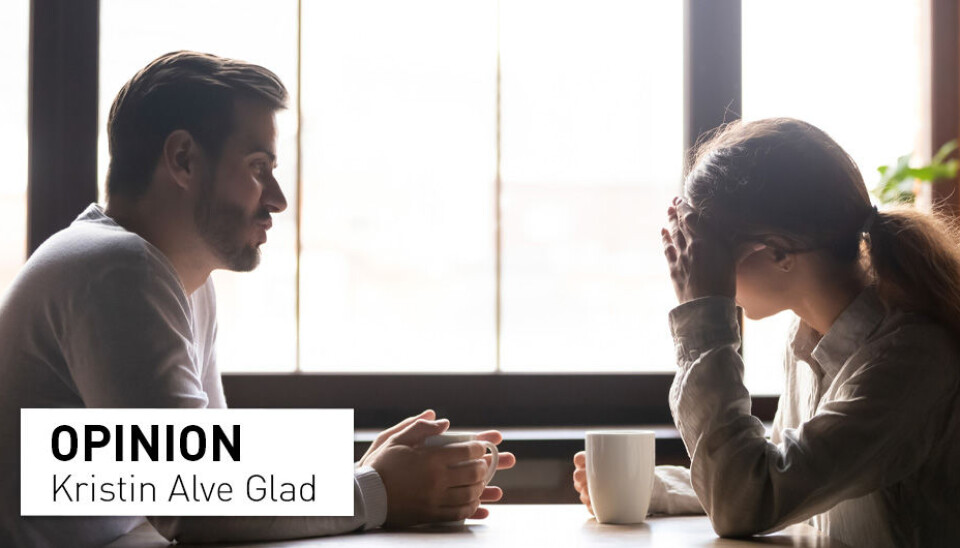Opinion:

Why do we condemn, blame and stigmatize people who have experienced something traumatic?
OPINION: Some trauma victims are met with negative social reactions when they tell others about what they have experienced. Why does this happen?
Most of us will experience one or more highly dramatic events during our lives, such as a fire, a car accident, serious illness, or violence and abuse. Such incidents can overwhelm us - and make us feel helpless and powerless. Often they pose a threat to our own or others’ lives, or to our own bodies and dignity. These events are often described as potentially traumatic; they have the potential to traumatize us.
One of the things that affects how harmful a potentially traumatic event is to us, is how we are met by others when we tell them about what we have experienced.
How do we respond to trauma?
There is great variation in how people who have experienced something potentially traumatic react.
Roughly speaking, researchers have found four trajectories: Most experience only short-term disruptions in healthy functioning. Some have moderate to severe symptoms that gradually decline. Others develop severe symptoms that persist. There is also a group that at first seems to be doing well, but then develops moderate to severe symptoms several months or years after the event.
We do not have a clear answer as to why we react so differently to trauma. But, both our personality and how we react emotionally during the traumatic event seem to play a role. The social reactions we face after a traumatic event are also important. That is, how we are met by our family, friends, colleagues and society.
Negative social reactions
We know that other people unfortunately do not always support those who have experienced something traumatic. Instead, some trauma victims are met with negative reactions, such as disbelief or rejection. Others are met with stigmatization and are treated differently as a result of the traumatic experience. Some traumatized people are also met with criticism, condemnation or blame, that is, they are themselves blamed for what happened.
In the following example, a woman who had been raped describes how she was not believed, but rather met with denial and blame by her parents:
It was just so awful that (my mother) didn’t believe I had gotten raped. She was sure I had asked for it…..(My parents) so totally brainwashed me that I wasn’t raped that I actually began to doubt it. Or maybe I really wanted it. People said a woman can’t get raped if she doesn’t want to.
Judith Herman, from Trauma and Recovery: The Aftermath of Violence, 1992, p. 67.
Some trauma victims say that these negative social reactions are even more psychologically disruptive than the original traumatic event.
In addition to such obviously negative social reactions, well-meaning attempts to help can also have a negative effect. For example attempts to get the trauma victim to stop thinking about or talking about the incident.
Why do others react negatively?
Most people believe that the world makes sense, that people are good and that we can to some extent control what happens to us, according to Ronnie Janoff-Bulman, a highly influential trauma researcher. A traumatic event shatters these basic assumptions. The world suddenly becomes meaningless, uncontrollable and unpredictable – and we realize how vulnerable we really are.
In this way, trauma victims pose a serious threat to our basic understanding of the world. If the trauma victims cannot be blamed for what happened, it can happen to anyone. It can even happen to us!
But, if the trauma victims are to blame, they no longer pose such a threat – and the rest of us can continue to think of the world as a predictable and safe place.
Negative reactions and mental disorders
American researchers have recently summarized the studies that exist on how those who tell others about their traumatic experiences are met. They emphasize how harmful it can be to their mental health to be met by negative social reactions after a traumatic experience. Many studies have, for example, found a strong association between negative social reactions and mental disorders in trauma victims, such as post-traumatic stress disorder and depression.
Certain forms of negative social reactions seem to be more harmful than others, according to the American researchers.
Although blame is often seen as particularly harmful, their results suggest that other reactions (which can often be well-meaning) – such as treating those who have experienced trauma differently, or trying to control or distract them – are especially important to avoid.
It’s possible that both controlling and distracting reactions are strongly associated with psychological distress in trauma victims because they encourage survivors to avoid the trauma rather than dealing with it.
What can we do?
Recovering from a trauma is not just about an inner, personal process. Recent research suggests that the social context around the victim may play an important role. It is therefore important that we are aware of how we talk to and handle victims of trauma – so that we can reduce the chance that we cause further damage.
So what should we do then, if a friend or a colleague tells us about something traumatic they have experienced?
One way to meet trauma victims is to provide emotional support. For example, we can show them that we take what they say seriously – and listen empathetically to what they tell us. We can also convey that what happened was not their fault and spend time with them.
———
Read the Norwegian version of this article on forskning.no
Share your science or have an opinion in the Researchers' zone
The ScienceNorway Researchers' zone consists of opinions, blogs and popular science pieces written by researchers and scientists from or based in Norway. Want to contribute? Send us an email!




























